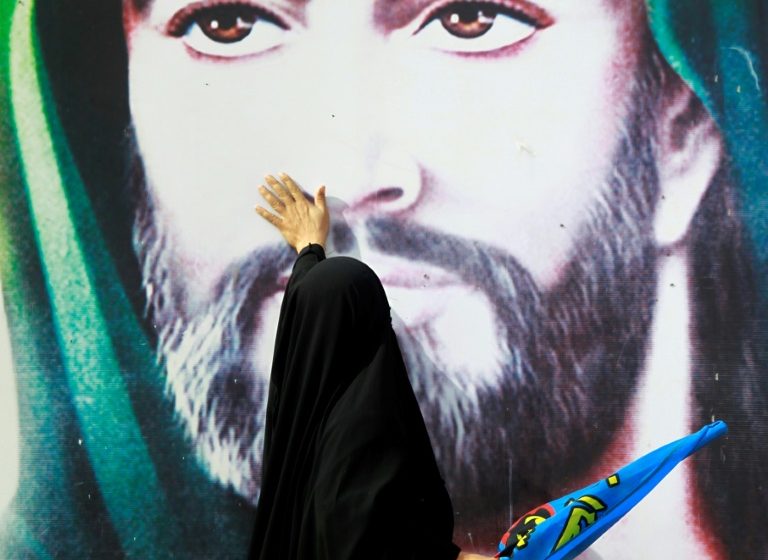Biggest winners in Iraq since US toppled Saddam Hussein

A Shiite Muslim pilgrim touches a portrait of Imam Hussein in the Iraqi holy city of Najaf during the Arbaeen religious festival, on November 26, 2015
Baghdad – Twenty years after US-led forces ousted Iraq’s Sunni dictator Saddam Hussein, the long-oppressed Shiite majority dominates the country’s politics, with all the powers and pitfalls that come with government.
The big winners of the 2003 invasion, Shiite Muslims, despite their frequent internal squabbles, hold preeminence over Sunnis and the ethnic Kurdish minority in post-war Iraq’s sectarian power sharing system.
They have ties with, and are watched over by, big neighbour Iran, which can be tricky as Tehran’s ruling Shiite clerics have been declared foes of the United States since the 1979 Islamic revolution.
In a country of 42 million people where Shiites comprise the majority, two decades of power have also meant Iraq’s Shiite figures are now held primarily accountable for the country’s many problems.
These range from continued insecurity and painful economic woes to entrenched corruption and nepotism.
The most visible change for Shiites after Saddam fell was that they were once more free to openly celebrate their faith and express their devotion to Imam Hussein, the founding figure of Shiite Islam.
Millions of pilgrims once more flock to the Ashura and other religious celebrations held every year around the golden-domed mosques and mausoleums of the holy shrine cities of Najaf and Karbala.
“Were the Shiites the winners of the post-2003 order? They are the winners in the sense that they are the largest group and therefore have the largest share in government,” said Marsin Alshamary, a research fellow at Harvard University’s Middle East Initiative.
By convention in post-war Iraq, a Shiite Muslim now holds the powerful post of prime minister and a Sunni that of parliament speaker while the largely ceremonial presidency goes to a Kurd.
– ‘New order’ –
In the 1990s, the Iraqi opposition in exile “was dominated by Shiite-centric and Kurdish ethno-centric actors,” said Fanar Haddad, assistant professor at the University of Copenhagen.
“It was only to be expected that the US’s principal Iraqi interlocutors would be the best positioned to benefit from US-led regime change. The US and the Iraqi opposition’s fixation on ethno-sectarian identities was unsurprisingly imprinted onto the nature of the new order.”
Two decades on, powerful players of what has been dubbed the “Shiite house” continue to dominate, even if many no longer hold official posts.
Among them are ex-prime minister Nuri al-Maliki and former senior officials Ammar al-Hakim and Hadi al-Ameri.
Many are opposition veterans from conservative and Islamist parties who once took refuge in Iran or Europe to escape the bloody repression of Saddam’s rule.
Since then “we have seen a consolidation of the political elite”, said Alshamary. “What has happened in the last 20 years is that they shifted from being officials to being heads of political parties that still have power even though they technically don’t have a state position.”
New players have entered the scene, some sponsored by Tehran, such as the Hashed al-Shaabi forces, formed years ago to join the fight against Islamic State group jihadists.
The Hashed’s former paramilitaries have since been integrated into Iraq’s regular armed forces and are also represented in parliament and the government.
Haddad said “there have been changes in elite politics in the last 20 years: new faces, decreasing influence of the exile politicians, generational turnover.
“However, the fundamentals of the system remain largely unchanged.”
Looking at the past two decades, Haddad concluded that “no single event has served Iranian interests more than the invasion of Iraq in 2003”.
– Popular ire –
The Shiite block has been anything but unified, and sometimes splits have sparked bloody violence.
After 2021 elections, a deep rift opened between the pro-Iran camp and followers of the powerful Shiite cleric Moqtada Sadr, culminating with deadly fighting in central Baghdad in August last year.
The governing elite has also been the target of popular ire, especially when mass street protests erupted in October 2019 and raged for months.
The youth-led cross-sectarian opposition movement vented their anger at everything from inept governance and graft to the country’s crumbling infrastructure and their own limited job prospects.
The protests raged, with hundreds killed in a crackdown, in Baghdad and the mainly Shiite south where many live in poverty despite the region’s oil wealth.
Alshamary said a “generational shift” has meant that for many young Iraqis the identity-based politics of old are “probably the last thing on their list of worries”.
“Most Iraqis born after 2003… grew up under a state where the thing they are confronted with most is rising income inequality and this very blatant corruption. For them, that’s what they’re fighting against.”
